
The Information Storage Bin
With more and more information being sought on the internet, our human skills are obviously going to be affected. Unless you do a lot of socialising of course but even then you need to pick the gems out of the gravel. We are no longer able to read body language. Or to know when to advance a point or hold back until a better time. Our interpretive skills need to completely change and we need to anticipate how we use information.
And this is why Information is always among the most prized commodities.
You need to become literate with information. Quality, truthful information is benefit people look for and prize. You send this information to your inbuilt storage bin.
How to Dig for Information
Early humankind didn’t have it easy finding information. Generally that came from Nature and Experience. Often not a comfortable way to learn.
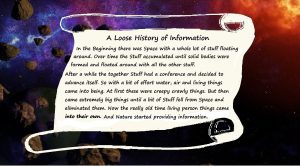
First of all make sure you word your search questions clearly otherwise you will get a swamp of information you don’t need.
Beware the information researched on Social Media. In fact be cautious of everywhere else too. Even some authority sites, especially with individual contributors, might contain small slips.
You need to make sure that the author does know what they are talking about. Just think, I could post something that is totally incorrect, false and misleading. I am only a person and I can’t know everything. But I can learn, as can you, to thoroughly analyse the information you find.
Seek your information from as many sources as you can find. Make time for this. Then compare the information. This will help you choose. Check out their links to authority sites as this exhibits confidence in what is written. And be thankful there are authority sites now. Nature is great provider of information but fire was a bit hot for early man.
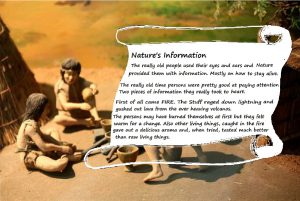
I always date my articles. If I want to update them, I put a ‘last updated on them’. Many people don’t do this and when you search you will find conflicting data. One of those annoying ones is the cost of items or services. I have often found several conflicts in the cost and nowhere found when the information was published. Always check the services or products producers to check this out.
Just remember, like me others are just people with a huge number of opinions. And unfortunately many don’t bear much similarity to truth. Always remember how easy it is to place an article on the internet regardless of correctness of content.
Read the articles carefully and watch for the ones that are well written. Good grammar and spelling may seem insignificant but believe me they are not and often show how knowledgeable and qualified the writer is. I am both fortunate in that I usually see these mistakes and unfortunate for the same reason.
For the first I am immediately put off the website and leave regardless of the quality of the information. For the second these mistakes make reading the article uncomfortable. I bet many older folks feel the same as we came from an education system that drilled spelling and grammar into us. Under threat of dire consequences usually:) Just kidding; my teachers were very good and patient.
Finally, if you don’t research thoroughly and your information isn’t correct then you will end up being embarrassed and most likely will lose visitors. After all the wheel wasn’t discovered in a day. It needed quite a bit of research to figure out how to use it.
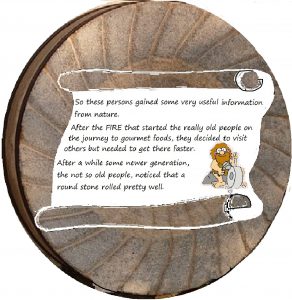
What You do with Information!
All the information you research and you can use in your articles needs to be thoroughly absorbed. All good information provides you with the basis to gain more as you continue to research. Even that not relevant to what you are writing, should be remembered: not so much in content but how you found it in the first place and what you did to authenticate it to the best of your ability. If someone points out it isn’t fully accurate then acknowledge that you are, at least, researching it further.
So you need to process and interpret the information you get. Then develop the way you present it. You need to be real so people know you are real and are giving them the best information possible. When you can do this, you will have a good understanding of how people’s minds work when reading your articles. The key is quality content.
When you are providing training in online marketing the information you gain can be presented as a free trial run in the first instance. This will help potential visitors to have confidence in you.
The original makers of the wheel might have been thought of as bogus presenters as it took some time and lateral thinking to make it work. In this case research for the wheels future potential could have turned the ‘false’ into one of the most useful tools we have today.
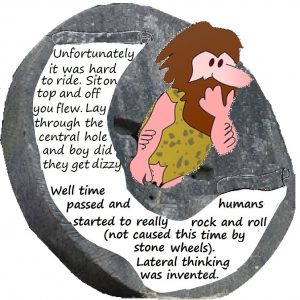
How You Present Information
Organisation is the key. It doesn’t matter how knowledgeable you are, if people can’t follow your information it is pretty worthless. I don’t know about you but instructions on how to properly use equipment of any kind is quite often incomprehensible. In my case we bought a DVD recorder; a very reputable brand too. From the first it wouldn’t work properly. My partner is an electronics genius and after reading the instructions and phoning the company the blooming thing still wouldn’t work all the time.
Eventually, in the middle of recording Dr Who, the machine froze. Now to us that was sacrilege. All of a sudden he grabbed the machine, took it outside and attacked it with the log splitter. Needless to say it never worked after that but boy did he feel better. And he is a miser and would usually seek a refund!
The thought here is, that once you have fully researched and verified the information you gain as much as possible, sit down and organise it. Pretend you know nothing about it and write it as an exercise to teach yourself.
Remember to ask questions of those you are providing information to. Get their comments and you will most likely learn a lot more information from them. And most certainly answer your website visitors questions. Myself, I always return to websites that I have two-way ‘conversations’ with.
Things to Watch Out For
The following is based on my information research. There are probably lots more and if you have any I have missed please let me know by giving me a comment on this article.
Beneficial Ingredients
My first computer was bought through a young fellow who was pretty rough. So much so that people complained and he was let go. But when I talked to him I saw he was a reflection of his time and didn’t mean any harm. The actual attraction though, was that he was totally besotted with computers and totally enthusiastic. I trusted him far more than the ‘must make a sale’ salesmen.
Check articles that are current, not opinionated and the source can pretty much be confirmed
Quality content is a must. In all respects. This won’t preclude some poor information getting through but will certainly help.
Thank goodness for the rapid communication methods we have today. Imagine sailing to places over many weeks just to ask a question.
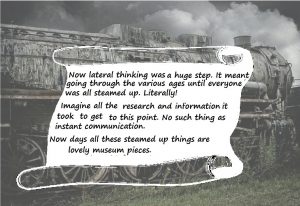
Don’t plagiarise If you are offering someone else’s exact quote, attribute them and put the quote in QUOTATION MARKS!
Find a target keyword so that people can easily see what your article is about.
Unhelpful Ingredients
When searching for information how often do you come across the websites or TV advertisements that go on forever. No mention of what is actually offered and never, ever any mention of prices. I think the creators are trying to bore us to death so we are in a trance and automatically hit the buy now button. Fortunately I am not one of these as very little advertising interests me. I go out and find a product I like and then make an assessment. If the sales person is pushy my hackles immediately go up. No sale.
Watch out for false promises. With practice in researching information you will soon find the presenters to be wary of.
Pressure is a good ‘red flag’ for presented information. You know the ones that say ‘only x number of places left’ so ‘buy within the next y hours’ to get your price deal. Take down the url of these sites and check them out for a couple of days. When I do this the places available and the hours left are always different; almost certainly more. (Less you can understand!)
The other poor information points are basically the opposite of my beneficial ones so I am not going to relist them.
An Informative Wrap Up.

I hope you enjoyed the very very loose history of information I have written. I am sure most of you will immediately see the gaps and omissions, an illustration of how information can be manipulated! With the world wide proliferation of communication, an avalanche of information is available. What you need to do is learn how to be discerning with it.
I love writing and have done much of this in my professional world. Not quite in the format I use online as much of it was technical. But all the principles still equate. Get it wrong in the technical world and accidents happen. The same is true in the online world albeit different types.
During my extensive research I found an absolutely wonderful group who refined my aim for developing an online presence. I won’t say it’s number one as there are so many platforms that say they do this but it certainly is at the top of the game.
I can confidently assure you that with the right attitude and word ethic you can do the same as I have.

So why don’t you have a look at the information that I have gained and written about in my website. If you like it you can take a free trial run and learn how to set up and own a website.
You have a choice of a free website domain or buying your own if you want. So take a tour and find out about Wealthy Affiliate, a huge group of very helpful people.
Share This

Great post I understand where you are coming from!
I have fallen into bad habits of changing words when texting and then continuing to spell them wrong when I start writing.
It is a bit sad considering my spelling and grammar used to be pretty good.
Andy, and I understand where you are coming from. My spelling and grammar used to be top notch. I aced English and English Literature and got great marks in science and technical reports too. I once got a draft report back from my boss. It was pretty full of red marks. While I was looking at it, another colleague came up and said ‘wow, I never get that few red marks from him!’
Now I keep spell and grammar checks on all the time and reread several times. And I still find glitches days later.
Plus I have developed dyslexia of the keyboard. I never know what my fingers will type!
Thanks for your comment and I hoped you liked my informal information tale.
Ciao
Helen
Searching for the right information in any form about any subject is a major quest for all of us in our daily lives. The internet is certainly a vast source of information , and as you have pointed out, not all of it is helpful. I am usually cautious of social media,as it can be rather conflicting at times. What information that we do uncover we have to use our own judgement about the usefulness.
Andrew, we certainly do need to become very discerning when deciding on accurate information. It used to be easier when information was passed physically and we could listen and observe the informer!
Over time you will pick up the signs of poor information. However some people haven’t the education and training to present information in a form that is believable. And unfortunately often these are really interesting people.
All we can do is try our best to sort everything out.
Thanks for your comment. See you around.
Ciao
Helen
My blog posts are often as much for me as for my readers. There is so much information available these days, admittedly a lot of it is ignorable noise, that I find it hard to retain newly learned information for any length of time. If I don’t record it somewhere, what I’ve learned will vanish like an early morning mist.
I don’t know if that lack of retention is because I’m not studying the information in the same way I would have studied my subjects in university. Or because my memory abilities are fading with age. I read, absorb temporarily, and move on. I feel like my brain is full and if I want to learn something new, I have to forget something old to make room!
Determining the accuracy of information can be problematic. Everyone online has an opinion and a bias towards whatever they want to talk about and disseminate information about.
I worry that the ability for people to engage in polite, reasoned discourse is being lost. You see that all the time online. Say something the original poster disagrees with or challenge them on the information they’re presenting and their civilized exterior drops away. They resort to name calling, telling you to f*** off (literally), disrespecting you, attempting to belittle you and so on. Mostly because they’re not able to back up their assertions and the information they present.
The real worry is that people get used to these unfiltered exchanges and they eventually spill over into the real world where face-to-face encounters end up becoming shouting matches or, worse, violent.
I have wondered whether road rage incidents are the vanguard of such behaviour seeping further into everyday life. It’s there already with people being afraid to speak out against others or chide them for bad behaviour because they’re afraid of the consequences. And the people they afraid of challenging are the very ones who don’t worry about the consequences of their own actions.
Information without oversight leads to the formation of echo chambers where like-minded people simply reinforce their world views and attack anyone who challenges them.
Bad and incorrect information is spread that’s actually detrimental to society. The anti-vaxers are a classic example. They base their assertions on a flawed study the results of which have been repeatedly shown to be patently false.
Yet the information is still out there, infecting people with false notions.
You have to take responsibility for the information you disseminate. That means you should do your due diligence on it before you pass it on to others.
Where facts are concerned, it’s black and white. A fact is a fact whether you believe it or not. And anyone who posts false information because it fits their world view better than a fact does, does themselves and their readers a huge disservice.
Gary, sorry about the delay in responding and discussing your comment. It took me a while to think about it!
As posts or any articles should be written from your heart and then your brain, they are for you too. I believe all these and any information you find should be indexed somewhere. Why? Not Because they are like mist, but because over the years you have filed away so much that your Dewey Decimal system is extremely extensive and needs some time to search and find information. That’s my excuse anyway!
Yes people are becoming so much more intolerant and they haven’t learned how to respond with some diplomacy. I always think it is funny how they won’t believe experts but will believe the person in the pub! I am not a genius by any means (I leave that to my sister) but I do know my profession. And have been ignored in the past much to the ignorer’s detriment.
If the uncivilised want to call me names, well my policy is at least they are leaving someone else alone. Then I block them. Foul language is the realm of the ignorant. (I can hold my own in this department due to my living in a male, tradie populated career. But I judge when and where to do this and it is face to face. And that has never become violent. It often, in fact, resolved issues.)
It is unfortunate that those who do exhibit due diligence, of whom there are a great number, are being outweighed by the loudest, overpowering online users. My policy is never to believe something unknown until I thoroughly check it out through known authorities.
As for black and white, yes facts are facts. The dilemma is sorting them out.
Well your comment certainly gave me some more food for thought. Watch out you might one day find my article on some of your information!
Thanks for this lengthy but well presented comment.
Ciao
Helen